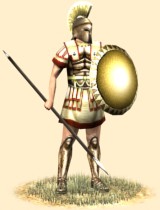Difference between revisions of "Hoplite (RTW Unit)"
(→Gameplay: hammer-and-anvil symbolism) |
|||
| (35 intermediate revisions by 6 users not shown) | |||
| Line 1: | Line 1: | ||
| − | [[Image:GREEK HOPLITE ELITE INFO.jpg|thumb|right|Greek Armoured Hoplites]] | + | [[Image:GREEK HOPLITE ELITE INFO.jpg|thumb|right|Greek Armoured Hoplites.]] |
| − | The | + | The hoplites were the backbone of hellenic warfare, just as the [[Legionaries (RTW Units)|legionaries]] would become that of the romans. |
| − | + | As such, they play an important role in Rome: Total War. | |
| − | Hoplites were | + | ==Historical Overview== |
| + | |||
| + | Hoplites were citizen-militia, probably first appearing in the late 600s BCE. Hoplites generally consisted of middle-class greeks, as they could afford their own equipment. As Ancient Greece was an agriculture-based society, most states could not afford a standing professional army (with the exception of Sparta), so as a result, warfare in Greece was intended to be decisive. Most wars were concluded with surprisingly few deaths, sometimes in even one pitched battle. However, hoplites began to decline over the centuries. With the Peloponnesian war, more focus went onto peltasts (light skirmishers), navies, mercenaries, and siege-engines. This also had the effect of greatly increasing the death toll. Consequently, this war and the wars that followed it greatly depleted Greece's limited soldiers, enough to facilitate a relatively easy conquest by Macedonia 66 years later. After this, hoplite warfare began to die-out and be replaced with the more-flexible macedonian variety of warfare. | ||
==Gameplay== | ==Gameplay== | ||
| − | All | + | All hoplites have the ability to form the phalanx formation. They are nearly impervious to frontal assaults. However, they are generally slow and cumbersome, and their rigid formation can easily be exploited with attacks to the side or the rear. Generally, hoplites shoud be used in the hammer-and-anvil tactic which Alexander The Great employed. In that tactic, the hoplites (which are symbolized by the anvil) hold the enemy, while another force (be it cavalry or more-manouverable infantry, which are symbolized by the hammer) destroys the enemy from the rear. It is wise to always support a hoplite-line with lighter infantry, in case of flanking manouvers. |
| − | ==Units== | + | ==Rome: Total War Units== |
===Greek Cities=== | ===Greek Cities=== | ||
| − | *Militia Hoplites | + | *[[Militia_Hoplites_(RTW_unit) |Militia Hoplites]] |
| − | *Hoplites | + | *[[Hoplites_(RTW_unit) |Hoplites]] |
| − | *Armoured Hoplites | + | *[[Armored_Hoplites_(RTW_unit) |Armoured Hoplites]] |
| − | *Spartan Hoplites | + | *[[Spartan Hoplites (RTW unit) |Spartan Hoplites]] |
===Macedon=== | ===Macedon=== | ||
| − | *Militia Hoplites | + | *[[Militia Hoplites (RTW_unit) |Militia Hoplites]] |
| + | *[[Levy Pikemen (RTW Unit) |Levy Pikemen]] | ||
| + | *[[Phalanx Pikemen (RTW Unit) |Phalanx Pikemen]] | ||
| + | *[[Royal Pikemen (RTW Unit) |Royal Pikemen]] | ||
===The Seleucid Empire=== | ===The Seleucid Empire=== | ||
| − | *Militia Hoplites | + | *[[Militia Hoplites (RTW_unit) |Militia Hoplites]] |
| + | *[[Levy Pikemen (RTW Unit) |Levy Pikemen]] | ||
| + | *[[Silver Shield Pikemen (RTW Unit) | Silver Shield Pikemen]] | ||
===Thrace=== | ===Thrace=== | ||
| − | * | + | *[[Militia Hoplites (RTW_unit) |Militia Hoplites]] |
| + | *[[Phalanx Pikemen (RTW Unit) |Phalanx Pikemen]] | ||
| + | ===Pontus=== | ||
| + | *[[Phalanx Pikemen (RTW Unit) |Phalanx Pikemen]] | ||
| + | *[[Bronze Shield Pikemen (RTW Unit) |Bronze Shield Pikemen]] | ||
==See Also== | ==See Also== | ||
| − | [[Category:RTW | + | *[[Phalanx]] |
| + | |||
| + | |||
| + | [[Category:RTW Units]] | ||
| + | [[Category:RTW Infantry]] | ||
Latest revision as of 03:11, 7 November 2024
The hoplites were the backbone of hellenic warfare, just as the legionaries would become that of the romans.
As such, they play an important role in Rome: Total War.
Contents
Historical Overview
Hoplites were citizen-militia, probably first appearing in the late 600s BCE. Hoplites generally consisted of middle-class greeks, as they could afford their own equipment. As Ancient Greece was an agriculture-based society, most states could not afford a standing professional army (with the exception of Sparta), so as a result, warfare in Greece was intended to be decisive. Most wars were concluded with surprisingly few deaths, sometimes in even one pitched battle. However, hoplites began to decline over the centuries. With the Peloponnesian war, more focus went onto peltasts (light skirmishers), navies, mercenaries, and siege-engines. This also had the effect of greatly increasing the death toll. Consequently, this war and the wars that followed it greatly depleted Greece's limited soldiers, enough to facilitate a relatively easy conquest by Macedonia 66 years later. After this, hoplite warfare began to die-out and be replaced with the more-flexible macedonian variety of warfare.
Gameplay
All hoplites have the ability to form the phalanx formation. They are nearly impervious to frontal assaults. However, they are generally slow and cumbersome, and their rigid formation can easily be exploited with attacks to the side or the rear. Generally, hoplites shoud be used in the hammer-and-anvil tactic which Alexander The Great employed. In that tactic, the hoplites (which are symbolized by the anvil) hold the enemy, while another force (be it cavalry or more-manouverable infantry, which are symbolized by the hammer) destroys the enemy from the rear. It is wise to always support a hoplite-line with lighter infantry, in case of flanking manouvers.
